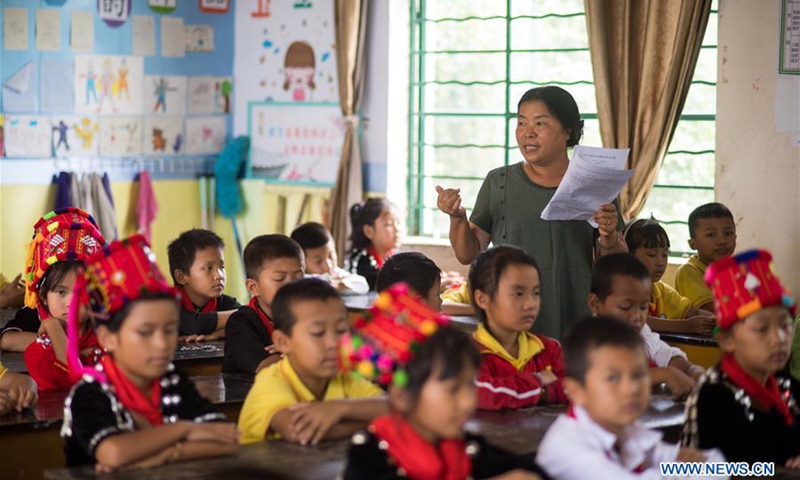One language to unite all ethnic groups
Source: China Daily Published: 2020/9/22 14:21:09

A teacher gives lessons at Yingpan Ethnic Primary School in Xishan Township of Mangshi City, Dehong Dai and Jingpo Autonomous Prefecture, southwest China's Yunnan Province, June 21, 2019.
Broad mindedness and inclusiveness are engraved in not only China's culture but also its national common language and characters.
In multiethnic China, the use of a common language and characters will not weaken ethnic minorities' cultures. Their use and popularization will instead enrich the country's national and cultural heritage.
We must respect the languages and cultures of different ethnic groups and do our best to protect them. On this basis, the active promotion and popularization of the national common language will enable people of all ethnic groups in different regions to strengthen links, and facilitate mutual communication, interaction and integration.
We should realize that the development of the national common language is open and inclusive. For example, in the development of Putonghua, many Cantonese terms such as bashi (bus), dishi (taxi), and maidan (pay the bill) have been included into the Modern Chinese Dictionary, and these words can be understood by ordinary Chinese people. This shows that the languages of all ethnic groups, as precious resources for the common language of our times, are important to understand the cultures and traditions of different ethnic groups.
It is worth understanding how China's national common language was composed, and what rich and diverse ethnic and regional cultures it contains. This study will also help Chinese of all ethnic groups to understand the contribution of their languages to the national common language.
The popularization of the national common language is more conducive to the communication, exchanges and integration of all ethnic groups.
There are concerns that the spread of Mandarin will destroy ethnic languages and local dialects, with some even worrying that the popularization of Mandarin is a move for "ethnic assimilation".Such unnecessary concerns can be eased and eliminated through communication, explanation and clarification.
Promoting the use of a common language does not mean all ethnic groups will move toward a single cultural system.
The aim is to break through the barriers between different dialects and deepen communication and understanding among the Chinese people across regions. The promotion of the common language also focuses on promoting cultural blending.
For example, young people of all ethnic groups in different parts can hold recitation and writing contests to describe their cultural characteristics, which will not only promote the common language, but also make them more proud of the nation and deepen their understanding of their ethnic cultures.
There is no doubt that the popularization of the national common language and characters on the basis of respecting diversity will facilitate the blending of different ethnic groups in China, enhance our ethnic unity and cohesion, enrich our culture, and promote our mutual love and melting.
Posted in: SOCIETY